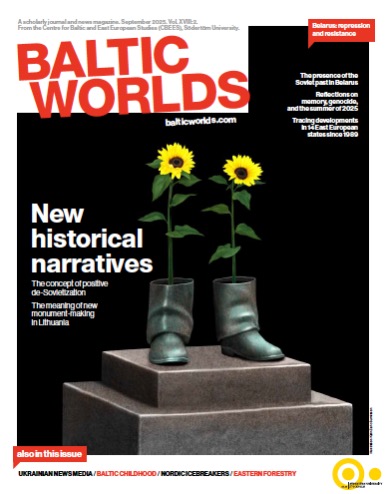Alexandra Biktimirova and Victoria Kravtsova
Alexandra Biktimirova is a student at the HSE University in Moscow and a feminist activist. Research interests center on the intersections of feminism and Islam in the Volga-Ural region in Russia, as well as globally. Coordinated the exhibition Feminist Translocalities in Kazan in 2020. Research interests are gender, muslim women, and relationships between discourses of power and marginality.
Victoria Kravtsova is a Feminist researcher, NGO-worker and activist. Born in Smolensk, Russia. Initiated Feminist Translocalities – a queer feminist network between the former USSR, Germany, and sometimes other locales, as wel l as a platform for supporting projects – publications, exhibitions, seminars, podcasts etc. Research interests include the intersections of feminist, antiracist and decolonial struggles in the countries of the former USSR.
view all contributors
Articles by Alexandra Biktimirova and Victoria Kravtsova
-
This publication shares with the reader autobiographical reflections of five scholars who still live and work in different regions of Russia. These social scientists have not left Russia for various reasons, which they themselves explain in their reflections. After having met at an informal meeting in early 2024, they have decided to voice their concerns about their troubled professional ethos caused by censorship, ideological pressure and repressive legislature. These concerns they conceptualize as moral dilemmas challenging their professional activities.
We have decided to publish these texts and to preserve their voices in order to let them tell their own stories to the reader. However, for the sake of security, all authors have decided to be pseudonymized
-
This article highlights some of Spekke’s activities during his proxy as head of the Latvian legation in Italy during the Soviet period, and immediately after re-independence when he was dividing his time between Italy and the United States.
-
Russian military personnel driving vehicles without license plates, billboards advertising holidays in Moscow, and Belarusians facing the demand to speak “a normal language” — that of the aggressor country responsible for about 30,000 civilian casualties in Ukraine since 2022. As well as these, one can find many more indicators of the growing presence of the so-called “Russkiy mir” (Russian world) in Belarus, a state in which Putin’s occupation is using less obtrusive tactics.
-
The projection of imperial power through overtly religious pageantry, symbols and narratives has been a key element of Russia’s identity politics under Putin, informing the Kremlin’s aggressive international policies, but also shaping the domestic perceptions of Russia’s global role.
In a conversation with Irina Sandomirskaja, Valentina Izmirlieva explores the utility of the Russian Orthodox Church in this process, and the significant transformations within the Orthodox sphere that facilitate the radical militarization of Russian society. She also discusses the role and future of multidisciplinary area studies as such, and in particular Slavic Studies.
-
The CBEES Summer School 2024 “The Return of History: Memory, War and the End of the "Post” is a specialized course that delves into in-depth studies of central theories of cultural memory.
-
At the upcoming CBEES Annual Conference 2024 (Södertörn University, 28–29 November) there will be a roundtable discussion on academic area studies journals related to the Baltic Sea region, Eastern Europe and Central Asia, organised by Ninna Mörner (Baltic Worlds) and Joakim Ekman (CBEES, Södertörn University).
-
This is a presentation of three original public opinion surveys covering the Baltic states, that were recently released in the public domain. All three surveys have been designed specifically to tap the political culture of Estonia, Latvia and Lithuania, including the Russian-speaking poulation groups and other domestic ethnic minorities.
-
With the full-scale Russian invasion of Ukraine, hybrid and conventional security threats to the Baltic Sea region and Eastern Europe became ever more imminent. The case of Ukraine shows that societal resilience and resistance can be crucial for ensuring national defence in an asymmetric war, in addition to savvy military operations. Yet, how can we understand and measure societal resilience in relation to national security and what governance modes in the Baltic Sea region and Eastern Europe can support it? These were the questions that scholars and practitioners discussed at the conference “How to be prepared? Governance for societal resilience in the Baltic Sea Region and Eastern Europe”, which took place on 12-13 October 2023 at Södertörn University Center for Baltic and East European Studies.
-
In this paper, the AfD is examined in an attempt to understand the success of the populist party in the recent referendum on the European Union. It is a rhetorical analysis in that the election results are interpreted embedded in its rhetorical situation. Given this result, the success in the eastern parts of Germany has been attributed to the socialization of the GDR-era and the dashed hopes after reunification. It is a lack of confidence in this aspect of democracy that provides a breeding ground for parties like the AfD, which they know how to exploit through the use of alternative fora such as TikTok and Twitter on which they promote their ideas on new boundaries and alternative governance.
-
On May 16 2024, a workshop was organised at the Centre for Baltic and East European Studies (CBEES), Södertörn University, that included presentations on geopolitical orientations in the Baltic states, Central and Eastern Europe, and the Caucasus.
-

 Issue 2025, 2:
Issue 2025, 2: